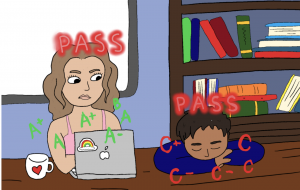Revealing Grades Comes At a Disadvantage
April 28, 2020
With the emergency distance learning implemented due to COVID-19, the credit/no credit system has been enacted in order to eliminate inequity and aid students in difficult circumstances.
In response, many parents and students have created petitions asking for the opportunity to show grades alongside the credit/no credit option, which would undermine the reasoning behind credit/no credit and should not be considered.
The credit/no credit option aims to benefit individuals who are struggling to maintain their grades at home due to extenuating circumstances. These conditions encompass a broad spectrum: it could be a lack of Wi-Fi or access to electronics, loud family members or health conditions.
“I didn’t expect to be directly affected by the outbreak,” a senior who asked to remain anonymous said. “I remember at the beginning, I thought that I was going to have a lot of time to work on school. But one by one, each of my family members got laid off, and it became harder and harder to support ourselves. The stress of getting into college was gone, but the reality of actually going was a problem because of the cost. I would spend more time looking for a job than doing my homework.”
By giving students the option to reveal their grades, Irvine Unified would be reinforcing the toxic mentality that grades are a top priority, especially in a situation as uniquely stressful as this one. The proposed petition would instill a fear that students may be penalized for opting into a credit/no credit option over showing grades, further burdening and even stigmatizing those disadvantaged by the Coronavirus.
Some juniors may feel that this policy is unfair, as their current semester is known to be crucial for college admissions. However, allowing students to show their grades creates an inequitable GPA boost opportunity for individuals privileged enough to not suffer consequences of quarantine. Students who are less privileged but also looking to raise their GPAs are therefore set at a disadvantage to their peers.
This unfair GPA boost opportunity only for the privileged dissipates the whole purpose of the credit/no credit system: students will still feel pressured to perform competitively, even under high stress.
Parents, students and teachers worry that students will feel discouraged to maintain effort in their classes and lose motivation. In addition, students feel that their hard work through the semester will be invalidated, as hard working students could be earning the same credit alongside others performing at the bare minimum.
However, recommendation letters remain crucial for college admission, and performances in current classes will be a large factor in a student’s ability to take rigorous courses next year, which will be taken into account by admissions officers.
There remains motivation to put forth effort in classes, as letter grades are not a sole basis of determining eligibility for college admissions or rigorous courses. Now is the time to demonstrate strong work ethic and effective communication, so that teachers are able to make equitable and fair decisions in regard to each and every one of their students.
Overall, it is important to recognize that distance learning began one month and a half into the second semester. This semester, though regarded as especially important for some, is not an accurate representation of an entire high school career. All students across the nation have been adversely affected by the quarantine, and in order to create the most equitable solution, there should not be the option for revealing grades alongside the credit/no credit system.




